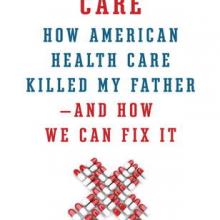Medicare
“Wisdom speaks her own praises, in the midst of her people she glories in herself.” What a luscious, full-bodied image from the biblical book of Sirach (24:1). Wisdom has sass! In an increasingly combative society, I’m drawn to Sirach’s prudence, poetic excess, and the authoritative agency of Lady Wisdom.
I’ve been keeping phrases from Sirach, also known as Ecclesiasticus, in mind as post-Roe legislation rolls across the states. The health of women and children (born and unborn) has been weakened, rather than strengthened. Political and social platforms ring out with dangerous nonsense about making criminal statutes apply at the time of fertilization, allowing the death penalty for abortion, or, conversely, promoting violence against “pregnancy crisis centers.”
How do we stop the howl when we feel urgently that lives are on the line? Sirach, which is part of the Catholic canon, says, “The fear of God is an abundant garden; its canopy higher than all other glory” (40:27). “Fear” means “body-trembling awe” before our Creator. Amid so much that I don’t understand and don’t know what to do about, this strange scriptural juxtaposition feels like Lady Wisdom speaking to our present condition.
It is possible to have a life without healthcare co-pays, deductibles, and premiums. It is possible to live in a country where we no longer watch our neighbors and loved ones suffer and even die because they cannot afford the care they need and deserve. And now we have an academically and economically rigorous study that proves it.
Senate leaders on Thursday unveiled a draft of legislation to replace Obamacare, proposing to kill a tax on the wealthy that pays for it and reduce aid to the poor to cut costs.
The only way to win the “war on poverty” is for liberals and conservatives to make peace — for the sake of the poor. That would be the best way to mark the 50th anniversary of the war on poverty, declared by President Lyndon Johnson in his January 1964 State of the Union address. Making peace means replacing ideologies with solutions that actually solve the problems of poverty. With both Republicans and Democrats speaking out on poverty this week, and the recession slowly receding this should be an opportunity to find the focus, commitment, and strategies that could effectively reduce and ultimately eliminate the shameful facts of poverty in the world’s richest nation.
For any proposal, the basic question must be whether it helps more people and families rise out of poverty and realize their dreams. This means setting aside political self-interest and thinking beyond our too often inflexible ideologies.
I signed up for Medicare last month. In addition to standard Medicare, I added Part D, the prescription drug benefit. My 2013 costs, if they had covered the entire year, would have come to $529 for insurance and $330 for prescription copays.
Today's mail brought the rates for 2014. The insurance premium has increased to $650, or by about 23 percent. Copays have also increased, to $616, or by nearly 87 percent. The total increase — assuming I won't need any additional medications — comes to 47 percent.
I was not happy when President Bush proposed and AARP supported Medicare Part D, the prescription drug benefit. The idea of insuring seniors' drugs was good. The resulting law, which specifically forbids the federal government from negotiating prices with pharmaceutical companies, was insane.
This week the company my husband works for unveiled the health-insurance plans available to us beginning July 1. If we chose the plan closest to our current plan, our premium would nearly double and our office visit co-pays would increase 25-50 percent.
I am so glad we are going on Medicare in August.
Medicare isn't perfect by any means. It isn't even cheap. Just the insurance (Medicare medical, Medicare supplement, prescription) is going to cost us more than $500 a month, and that doesn't include the deductible or the prescription co-pays. And that's for this year. Who knows what it will cost 10 years from now?
I was so ready to read a book that would solve America's health-care crisis.
Besides, David Goldhill's title is irresistible: Catastrophic Care: How American Health Care Killed My Father - And How We Can Fix It.
Researchers at Harvard Medical School found immigrants contributed $115 billion to the Medicare Trust Fund over a seven-year period. In 2009 alone, immigrants contributed $13.9 billion more to Medicare than they used. The report encouraged allowing legal status for undocumented immigrants to help offset health care costs in America. USA Today reports:
"The assumption that immigrants are just a drain has been a part of the argument that people should be denied services," said Leah Zallman, lead researcher and an instructor at Harvard Medical School. "Immigration policy has been closely linked to Medicare's finances."
Read more here.
I’m a senior. And I’m mad. In fact, I am resigning from the AARP.
The America Association of Retired People has about 38 million members and is one of the biggest, most influential lobbies in Washington. It has done many good things for older Americans, but in some important ways it is just plain wrong — selfish and guilty of intergenerational injustice.
As Fareed Zakaria pointed out is a 2011 column in Time, the federal government spends about $4 on every senior over 65 and only $1 on every child under 18. “That is a statement about our priorities,” Zakaria rightly says, “favoring consumption over investment, the present over the future, ourselves over our children.” Partly as a result the poverty rate for children (22 percent) is much higher than that for seniors (9.7 percent).
The discussion we are having about “the fiscal cliff” is really a debate about our fiscal soul. What kind of nation do we want to be? We do need a path to fiscal sustainability, but will it include all of us — especially the most vulnerable? It’s a foundational moral choice for the country, and one with dramatic domestic and deadly global implications. It is the most important principle for the faith community in this debate.
I had a recent conversation with an influential senator on these fiscal issues. I said to him, “You and I know the dozen or so senators, from both sides of the aisle, who could sit at your conference table here and find a path to fiscal sustainability, right?”
“Yes,” he said, “we could likely name the senators who would be able to do that.” I added, “And they could protect the principle and the policies that defend the poor and vulnerable, couldn’t they?”
“Yes,” he said, “We could do that too.” “But,” I asked, “Wouldn’t then all the special interests come into this room to each protect their own expenditures; and the end result would be poor people being compromised, right?”
The senator looked us in the eyes and said, “That is exactly what will likely happen.”
It will happen unless we have bipartisan agreement, at least by some on both political sides, to protect the poor and vulnerable in these fiscal decisions — over the next several weeks leading up to Christmas and the New Year, and then for the longer process ahead in 2013.
But for that to be viable, the arithmetic must work.
Florida governor Rick Scott says he won't take the federal money that would enable Medicaid to be expanded in his state, The Nation's blog reports:
"Nearly 1 million Floridians will be denied access to Medicaid they would have otherwise received under the Affordable Care Act if Governor Rick Scott gets his way. The Supreme Court ruling last week on the law made it easier for states to opt out of an expansion, and Sunday night the governor’s office e-mailed a statement from Scott that 'since Florida is legally allowed to opt out, that’s the right decision for our citizens.'”
This choice is particularly ironic, given that Scott was CEO of Columbia/HCA in the 1990s: that company was found to have defrauded Medicare on his watch. Eventually the company pled guilty to 14 felonies and paid fines of $1.7 billion. Scott denied knowing what was going on when he was in charge of the company. As the Miami Herald reported:
"He has denied knowing frauds were taking place while he was there, and he was never charged with any crimes.
"However, federal investigators found that Scott took part in business practices at Columbia/HCA that were later found to be illegal -- specifically, that Scott and other executives offered financial incentives to doctors in exchange for patient referrals, in violation of federal law, according to lawsuits the Justice Department filed against the company in 2001."
Our health care system is not arbitrary. It does not operate by a set of principles that are beyond comprehension. We govern it. We participate in its capitalistic maneuvering and its political favoring. My family has health insurance in part because we have been given advantages due to racial identity, family networking, and being part of the 1 percent. All of these things have worked specifically in my favor to save the life of my dear mother. None of this is fair.
When I praise God for my mother’s enduring health, it is impossible not to think of how many others have indirectly contributed to this success. And to wonder if we have also indirectly contributed to their failures.

We'll be hearing a lot about Medicare between now and November. President Barack Obama wants to tweak it. Mitt Romney wants to reinvent it. Everyone who wants to get elected, however, agrees on one thing: nothing will change for the current crop of seniors and soon-to-be seniors.
Whew. Six months and Mr. Neff will be home free! Less than a year and a half and we'll both have free health care! And then we can afford to retire, right?
Wrong.
Remember Rep. Paul Ryan’s 2011 budget, The Path to Prosperity? Well, it’s baaa-aaack — and this time the path is smoother and wider and offers a quicker trip to judgment.
Christianity and most of the world’s faith traditions explicitly demand protection for the poor and the preservation of the lives and dignity of all. Well, the Chair of the House Budget Committee, Ryan, high-tails it down his Path, budget rolled in-hand, in the exact opposite direction from those moral commitments.
Bob Greenstein, president of the Center on Budget and Policy Priorities (CBPP), concluded that the Ryan budget “is Robin Hood in reverse — on steroids. It would likely produce the largest redistribution of income from the bottom to the top in modern U.S. history and likely increase poverty and inequality more than any other budget in recent times (and possibly in the nation's history)."
Any responsible budget plan requires a balanced approach that would both increase revenue and reduce spending. This proposal would cut taxes, merely hope for revenue, increase military spending, and slash most everything else that isn’t protected by large corporate interests.
How Can You Get Health Insurance if You're American with a Pre-existing Condition? Live Long Enough.
This Sunday is an important milestone for me. It's the day I no longer risk losing health insurance.
I left my last job-with-benefits when I was 51 years old. I'd been commuting an hour and a half each day, and I was worn out. My husband had excellent health insurance, and publishing jobs were plentiful.
Six weeks after my job ended, however, the dot-com bubble burst and jobs everywhere started to dry up. In 2003, I discovered I had a great big pre-existing condition — a defective heart valve and an aortic aneurysm that would eventually require surgery. I became uninsurable except through my husband's employer (and mine, should I ever find another job).
And then in 2008, the year I turned 60, the whole economy tanked. I realized I was now entirely dependent on my husband's employer for health insurance, since I would probably never again have a job-with-benefit.

"Homeless and Cold" in New York City's Lincoln Square, 2010. Image via Wylio http://bit.ly/t8fOzE
There are times when a story in the news just makes one stop with a righteous indignation.The news I heard today that one in two Americans is now classified as poor makes me angry.
This means half of the people living the richest nation in the world are poor. Is this the American exceptionalism we want?
I am angry because this is a not necessary. I am angry that so many people are suffering, while our elected officials are playing games, unable or unwilling to do what is necessary to promote the general welfare of the nation.
U.S. Bishops Should Focus On Economy, On Deficit Reduction; The Public Has Spoken: Tax Hikes On Rich, No Cuts To Medicare; My Foreign Aid Budget Starts At Zero; John McCain 'Very Disappointed' By GOP Candidates' Endorsement Of Waterboarding; Keystone XL: Despite Delay, Oil's Grip Remains Strong; Latino Evangelicals Challenge Alabama Brethren On Immigration; Mariann Budde, Diocese Of Washington’s Next Top Bishop, Has Plans For Reviving The Episcopal Church.
Will we control high U.S. health-care costs, or just shift them to seniors?
It is reported that Congressman Paul Ryan makes every member of his staff read philosopher Ayn Rand, the shame











